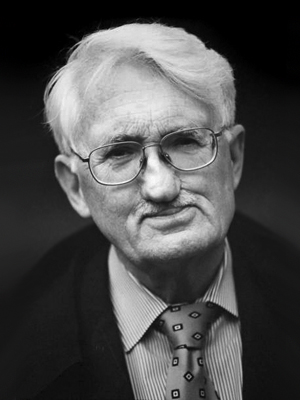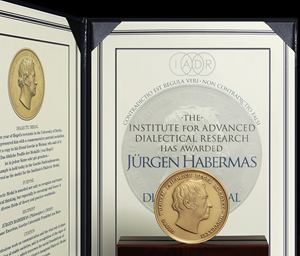         |
||||||||
   |
||||||||
 (Photo: Raphael GAILLARDE Getty Images) |
DIALECTIC
MEDAL LAUREATE—2O2O
CITATION:
DIRECTOR'S STATEMENT: “There was no doubt that the inaugural Dialectic Medal should go to Prof. Habermas," says Institute Director Dr. Justin Burke. "He is widely acknowledged as one of the greatest living philosophers in the world today, as well as someone whose work has always embodied a strong dialectical element—from his first major critical essay, ‘The Dialectics of Rationalization’ (1954) to his recent magnum opus: Also a History of Philosophy." "Dialectic itself features prominently in that philosophical history," Dr. Burke says. "Hegel’s conception of it is that thought entails its own unfolding and development through what Habermas calls ‘the power of negation’. In fact, Hegel once explained to Goethe that dialectic is ‘nothing more than the regulated, methodically cultivated spirit of contradiction inherent in every human being, which proves itself to be a great gift for distinguishing the true from the false.’” STATEMENT FROM PROF. MARTIN JAY: Philosopher Martin Jay, author of The Dialectical Imagination, cites the word dialectic’s Greek origin, which suggests that thought develops through moving back and forth between opposing arguments that never achieve the status of settled truth. “There is perhaps no more consistent dialectician in this sense”, he says, “than Jürgen Habermas, who in his long and distinguished career has both advocated the fundamental importance of persuasion through the better argument, and performatively sought to realize it in his frequent and courageous interventions in the public sphere.” STATEMENT FROM PROF. MAEVE COOKE (UNIVERSITY COLLEGE DUBLIN): "Recently there have been a number of attempts within political theory to move beyond a crude distinction between negative and positive liberty. The most interesting attempts conceive of freedom as a dialectical movement between two distinct moments, one individual and one communal, that depend on one another for their full development. From his early writings on Discourse Ethics, Habermas has conceived of freedom in this way. Following his discourse-ethical conceptualization of moral freedom in the 1980s, in his work on law and democracy in the 1990s he construes political freedom as a similar kind of dialectical movement. In the political case, he characterizes the dialectical relationship between the individual and communal moments – between what he calls 'private' and 'public' autonomy – as a relationship of 'co-originality'. By this he means that neither moment is logically prior; furthermore, that they are mutually irreducible, interdependent and of equal normative weight. Isee this as one of the great strengths of Habermas' approach to freedom, an approach which is increasingly important as humans globally experience the devastating impact of the prioritization of individual choice and decision – of the individual moment of freedom – within modern Western traditions of political theorizing.". |
|||||||
|
DIALECTIC
MEDAL PRESENTATION |
|
|||||||
  |
|
 |
||||||
|
© 2O2O–3 INSTITUTE FOR ADVANCED DIALECTICAL RESEARCH
|
||||||||



